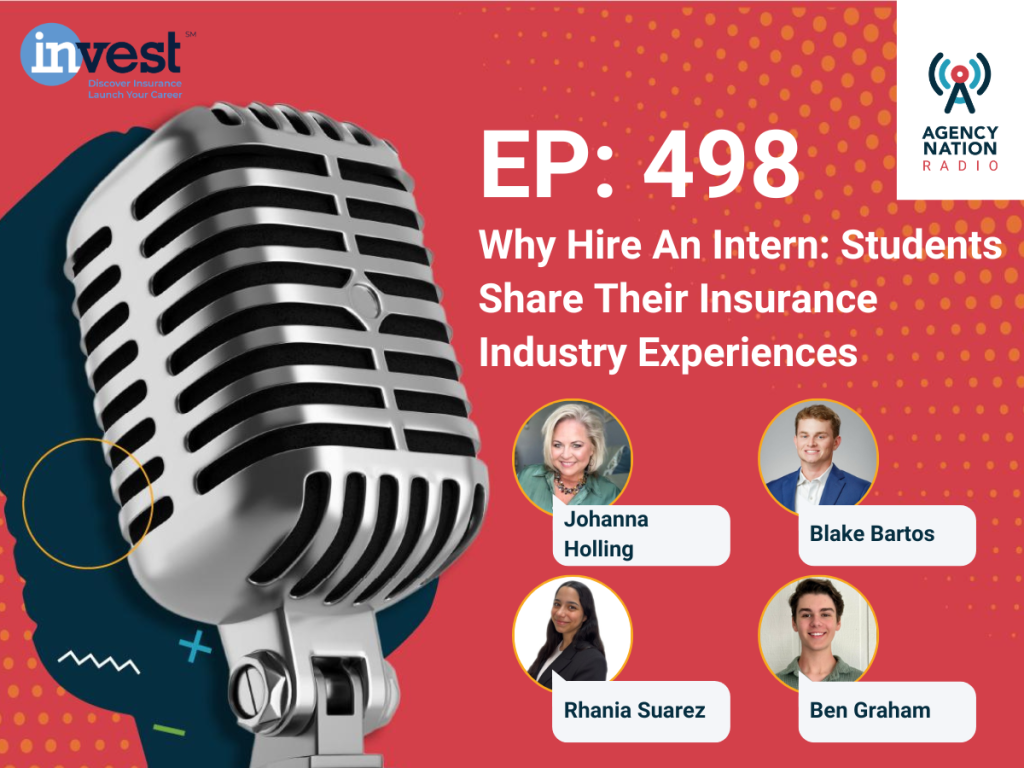The X Factor: How Gen X Agents Are Leading the Way

By: Jacquelyn Connelly
Nearly 20 years after she first entered the insurance industry as a part-time filing clerk, Lashonda Billue, 38, decided to start her own independent insurance agency in Brunswick, Georgia: Innovations Insurance Solutions LLC.
During the two years Billue took off to have her son, her husband—a fellow business owner who runs local non-emergency transportation company SNS Transportation—never stopped encouraging her to get back into it.
“I would talk about insurance all the time,” Billue laughs. “He kept saying, ‘You seem like you miss insurance—why don’t you just work for yourself instead of trying to go back to an agency?’ I decided to go ahead and take the leap of faith.”
Like many agents, Billue calls her initial entry into the insurance industry “accidental.” Despite plans to become a psychologist or social worker, she stumbled across her first insurance job listed on a post-it note in her college career center. While completing her degree and serving in the military, Billue gradually moved up the ranks at that first agency—from filing clerk to account manager to agency manager.
An impressive trajectory, but not an uncommon one among Billue’s peer group. Often called “the forgotten generation,” Generation X—those born between 1965 and 1984—has earned a repu-tation as a cohort of hard-working, independent self-starters who loathe micromanagement and value work-life balance.
What better fit for those characteristics than starting an insurance agency from scratch, or purchasing one young and running with it? As Gen Xers get comfortable in agency leadership positions, here are four priorities they’re keeping in mind.
TRADITION
Like Billue, Kelly Rice, vice president and account executive at Albion Insurance Agency in Albion, Michigan, says she “fell into insurance on a whim.” A kinesiology grad who was feeling unappreciated in her first job as a sportswriter, Rice took a position as a receptionist at the Lappan Agency in Alpena, Michigan—and never looked back.
“I was fortunate enough to have some great mentors who saw my potential,” says Rice, 39, who credits the third-generation owners of that first agency, brothers and boomers Tom and Steve Lappan, for the strong sense of ethics she and her husband Greg carry into their business today. “They instilled the importance of making certain to abide by specific ethical standards and set the bar high.”
As a direct result of those values, Rice watched the Lappans enjoy “great success from referrals and word of mouth. People just enjoyed doing business with them, and we very much try to mirror that. We don’t have a huge marketing budget, but because of the referrals, people trust us.”
Billue also relies heavily on community roots, but takes a different approach. “When you’re starting from scratch, you don’t have referrals,” she points out—which is why she developed a sophisticated outreach plan that involves dedicating the first three days of each week to targeting specific groups of prospects: auto dealerships, title pawns, diversity-based businesses and more.
“Every day, I make a point to say, ‘I’m going to talk to five different people that I have not talked about insurance with.’ I give out little baggies with insurance brochures, goodies like pens and notepads and things like that, and I’ll just go up to people without solicitating. I’ll talk to them, get their name and information, and usually I can call them or get them to come in,” explains Billue, who also hosts educational workshops to teach businesses in her community about insurance—no strings attached.
That personal touch is a boomer legacy Gen X agents are holding on to—hard. “The biggest thing we stress in this office is always, always our customer service,” says Amy Bailey, owner of Starr Insurance, headquartered in tourist town Custer, South Dakota with a second location in Rapid City. “I’m not owned by a corporation, I’m not owned by a bank, I don’t have 14 branches. I stress with my staff that our customer service has to outshine everyone else around.”
Rice believes that quality gives her generation an advantage over younger agents. “I worry about millennials being a little detached, because so many of them don’t have to socially interact anymore. Everything’s online—they can do it all with a text or an email,” she says. “My generation still has that person-to-person factor. I don’t want to see us be the last generation to provide that superior customer service.”
Cecilia Fournil, who started Vista Insurance Group in Columbia, South Carolina with her husband 10 years ago, calls it the “phone fear” phenomenon, and she sees it every day with her exclusively millennial staff.
“I’ll have employees say, ‘The underwriter’s not responding.’ ‘Well, did you try calling them? What are you afraid of?’” says Fournil, principal. “That can be very crippling.”
TECHNOLOGY
But high-touch engagement doesn’t mean Gen Xers shy away from technology. On the contrary, most Gen X agents cite their adaptability to innovative technology as one of the key factors that sets them apart from their boomer predecessors.
When Bailey joined her agency 20 years ago, “we weren’t so tech-savvy. You did everything on paper, you printed everything, and you put every piece of paper, every note, into that paper file. We’d have files that were six inches thick,” she recalls. “Now, we’re almost paperless.”
“That wasn’t a priority previously,” agrees Rice, who notes that she and her husband are “more environmentally conscious” than Greg’s parents, who sold them the agency.
When Joe Patrick, 42, purchased McCord Insurance Agency, Inc. in Cincinnati, former owner Larry McCord promised him two years for the transition. Instead, he was there 12—and only left when he had a health scare. Within the same three-week timeframe, the agency’s veteran CSR retired, and Patrick was tasked with training her replacement.
By that point, Patrick had purchased a second agency, Wilson & Shanesy Insurance Agency in West Carollton, Ohio. “It was one CSR and me in one agency, and one CSR and me in the other,” he says. “I was driving back and forth between the two agencies—it was a rough patch.”
Patrick found a solution in technology by teaming up with Intelligent Office, a provider of virtual office space and staffing services, which enabled him to close one of his storefronts. For a monthly fee, Intelligent Office gives Patrick access to office space and conference rooms when he needs them, as well as the option of phone lines staffed with trained receptionists who can answer calls and assist clients.
Outsourcing tech-related services is an appealing solution for many Gen X agents. When Rice and her husband bought their agency, their first project was contracting an IT vendor to revamp the agency website.
Today, Rice keeps the firm on retainer, paying a monthly fee in exchange for a variety of services, including troubleshooting issues and researching companies that offer tech services to the agency. “I don’t have half a day to figure out why my printer won’t print,” she says. “It’s well worth the cost to have them at our beck and call.”
Like Rice, John Dark, second-generation principal of Dark Insurance Agency in Alexander City, Alabama, recently hired a vendor to revamp his agency website and focus on contemporary marketing strategies like SEO.
Dark also personally creates targeted posts for Facebook, LinkedIn and Twitter “every day,” he says. “I know how to get the results—I don’t want to just put something out there just to put it out there.”
For Dark’s boomer employees, the shift to digital hasn’t always been easy. For example, the agency uses a service called Rocket Referrals to send clients a two-question survey about their service experience.
“To do that, we have to have all our customers’ email addresses in our system, and we found out we only had about 30% when we started,” says Dark, 43. “Remembering to collect those email addresses didn’t come as easily for employees who had not done so for so many years prior.”
Of course, the same tech that rubs boomers the wrong way is a baseline expectation for millennial employees. “Technology’s huge with us because the millennials love that,” says Fournil, 44, who utilizes VoIP and Skype for Business to allow her millennial staff greater flexibility. “Everybody’s got a laptop, so if you need to work from home, work from home. There’s no reason you have to be in the office—the office is just there to help you stay a little more disciplined.”
TEAMWORK
Discipline is another area where Gen X takes a different approach than boomers. At Patrick’s first agency job, “they gave me a cubicle, a phone book and a phone and said, ‘Go out and get it,’ with no real tools or know-how of how to do it,” he recalls. “It was a miserable failure.”
“Boomers are more, ‘Hit the pavement,’” Billue agrees. “The owner of the agency where I worked before was like, ‘I don’t care how you get it—just get it.’ We had to fend for ourselves and bring people through the door.”
Fournil was put on straight commission as a first-time producer. “My second boss said, ‘I’ll give you a chance, but I don’t think you’re going to succeed.’ That was my interview, and he was actually a friend of mine—he knew me since I was a child.”
Rice recalls hearing about several agencies where “upper management had this attitude of, ‘You’re 20-something, you don’t want to do what I’m telling you to do, so go—we don’t care, we’ll just hire someone else.’”
But the “love it or leave it” approach doesn’t necessarily sit well with a generation notoriously curious about the “why.” “The old leadership is more of a top-down directive with rigidly defined roles—‘I’m the boss, you’re this, the CSRs are this, and that’s how things get done on the assembly line,’” Patrick says. “If you’re on the low end of that rung, you’re less invested, less loyal, less interested in the final outcome.”
By contrast, Patrick says, “if you’re in a team approach, everybody benefits from progress. My leadership style is more collaborative, more empathetic. It involves lots of use of the term ‘we’ instead of ‘you.’”
Fournil ended up being the top producer at that second agency, but she realizes not everyone responds positively to that kind of challenge. When she and her husband started their agency, “we sat down and said, ‘What did we not like about our careers prior to this date?’ We really try to help our employees want to be a part of a successful business, because we know a good culture is going to breed someone who’s going to go that extra mile” [see p. 31].
“I want a person who genuinely wants to work in insurance. I don’t want a person coming through the door where they just want a job,” Billue agrees. “Your customers can feel it when a person is excited and loves what they do.”
And hiring that person requires a certain level of cultivation. “You have to work with them,” Rice says. “You have to put in the time and energy. You cannot just go out and find that person, because not every personality gels with being in insurance.”
That’s especially true when managing millennials, who require a lot more attention in the office than many managers may be ready to provide, Fournil says: “The older principal can tend to be more patronizing. They don’t sit down with the millennials and go, ‘OK, what’s wrong?’ You have to stroke their ego a little bit, because if you don’t, you’re not going to get anywhere.”
Billue, who recently hand-picked a new CSR from her local Target store based on her excellent attitude and customer service, agrees that tapping into the “great energy” of millennials requires focusing on education.
“She’s nervous because she’s never worked in sales before,” Billue points out. “When you have a new agent, you have to explain things and get them comfortable. If they understand what they’re doing, they’ll be more effective.”
TIMELINE
Perhaps the greatest difference between Gen Xers and boomers is in the realm of future planning. Many Gen Xers either bought or started their agencies young—which gives them a unique perspective on perpetuation.
At just 29 years old, Patrick purchased McCord Insurance Ag-
ency through a Big “I” connection [see sidebar]. “I took Larry out to lunch and said, ‘I want to talk to you about the future of your agency,’” Patrick recalls. “He looked me in the eye he said, ‘The big guys keep knocking on my door, and I want to give somebody the same opportunity that my uncle gave me.’”
Rice had been in the industry for five or six years when she attended an insurance conference where she met her husband. He worked at the agency owned by his parents, and when they had been married a few years, Rice started working at the agency as well.
When she was just 35 and Greg 39, the couple bought the agency and Greg’s parents officially retired. “They had the agency for 20 years by that point, so it took a little while to instill the trust, but they are totally done,” Rice says.
Bailey, 49, officially took the ownership reins of her agency in 2013—the same agency where she started her career 20 years ago. “I became invested right away because the owner, Ed Starr, always said he would sell it to me,” she says. “He had only purchased the business two years prior to me coming on, and I helped him double his business in three years.”
And Bailey is taking a leaf out of her old boss’s book by investing in one of her CSRs, Karen Nielsen, as the future buyer of Starr. “She’s my right-hand woman—I hired her and I’ve worked with her for 13 years,” Bailey says. “It really makes a difference when you have someone coming up behind you that cares as much as you do. They take care of it like your own.”
Dark and his brother recently bought into the agency at 24% each, with their dad maintaining 52% ownership. But he’s already thinking about next steps, too: “If you’re in an agency like mine that’s been going on for so long, the show’s got to keep going even when my time’s up. I know I’ve got to have the right people plugged in so that when it’s their turn to step up, they’ll be ready.”
Rice believes the Gen X entrepreneurial spirit may surprise some boomers. “A lot of boomers did not have the opportunity to be a business owner until later in life,” she says. “But if we have the opportunity, people my age are like, ‘We’ll jump on that, we’ll make you an offer, we’ll go ahead and take it on.’”
There are a “fair number of agencies” in Albion, Rice says—and she and her husband “would like to position ourselves to be ready to possibly make them an offer, because the perpetuation may not be there for them. We’re young enough to try and build our readiness to expand in that way.”
Billue, too, is scouting potential acquisitions. Inspired by her husband, who recently purchased a local business for about a fourth of its worth simply because the owner “wanted to get rid of it,” she points out several local agencies that have been operating for 30-40 years. “One of the principals is over 80 years old,” she says. “I’ve got my eye on that book of business.”
But Billue is also considering an eventual family perpetuation. Her son is only 5, but “I’m hoping I can groom him to take over when he’s ready,” she says. “He tells me he wants to be a football player, but there’s plenty of time to change his mind.”
Jacquelyn Connelly is IA senior editor.
Big ‘I’ Opens DoorsJoe Patrick, president of McCord Insurance Agency, Inc. in Cincinnati, as well as Wilson & Shanesy Insurance Agency in West Carrollton, Ohio, counts two Big “I” leaders as role models: his dad, Lee Patrick, a fellow agency owner; and Larry McCord, who sold him his first agency—both of whom have served as president of the Ohio Insurance Agents Association. “My dad got me involved with the Big ‘I’ from an early age,” Patrick says. In fact, he met McCord on a trip to the annual Big “I” Legislative Conference, which he attended for eight years fresh out of his first job as an underwriter at Cincinnati Insurance Company. “I walked down the street in D.C. with Larry before we even hooked up as business associates, just to get to know him as part of the Ohio contingent,” says Patrick, who served as his state’s Young Agents Committee chair in 2004 and was named Ohio Young Charger in 2006. “I was getting a job interview and neither one of us even knew it.” Andrew Coard, president of The Peoples Agency in Eatonton, Georgia, got involved with the association after his first time attending the Independent Insurance Agents of Georgia (IIAG) convention in 2005. He only had a year and a half of insurance industry experience under his belt, but Greg Tapley of Tapley & Associates, incoming IIAG YAC chairman at the time, noticed his first-timer sticker and called him afterwards to ask what he thought of the event. “I said, ‘I guess it was good if you knew what you were doing, but this was lacking and this was lacking and it could have been so much better for a first-timer,’” recalls Coard, 48. “He said, ‘Well, while I have you on the phone, would you like to join the board as first-timer liaison? Those are really good ideas—why don’t you put them into practice at next year’s convention?’” Today, Coard is president-elect of IIAG. “When I got onto the Big ‘I’ board, that’s when I met the older, more experienced agents who’ve run agencies, and all of them combined is what kept me going,” he says. “It wasn’t just one person I worked with who was my greatest mentor. It was the interaction with the agents every year at the Big ‘I’ events. It was learning from them and getting their contact information.” Coard graduated from university with a bachelor’s degree in business management and originally went into computer management, working in IBM’s distribution system configuring networks for large American corporations. But insurance is home now, he says: “I don’t think I’d go back to the computer industry. This is a vibrant industry, and I love it.” —J.C. |










